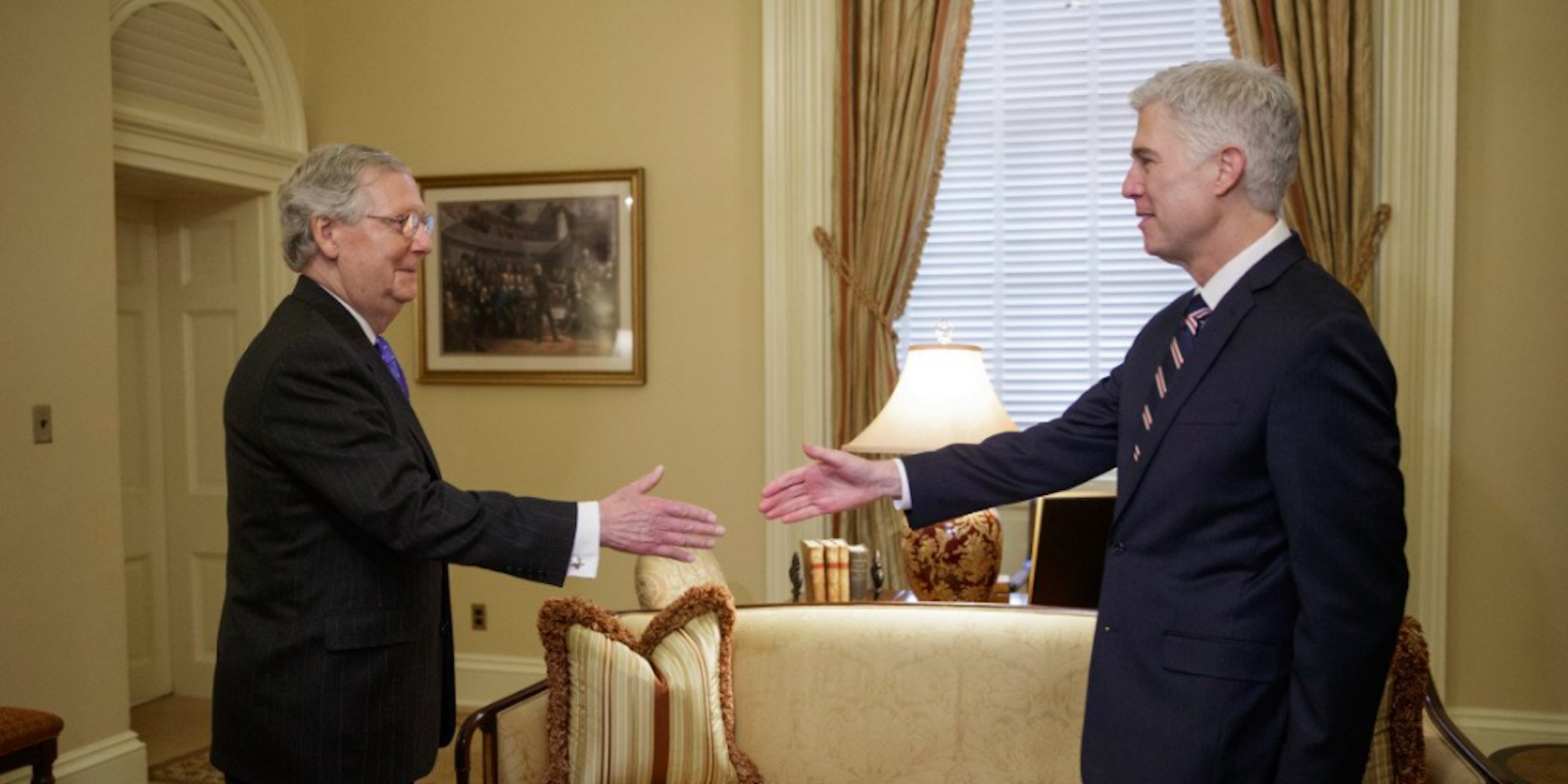Opinion
Today, while America has been embroiled in a raging debate over civility in its politics, the Supreme Court ruled to uphold President Donald Trump‘s travel ban. While those things might not seem directly related, a tweet by Sen. Mitch McConnell (R-Ky.) illustrates how they’re the perfect culmination of both this week in politics and the past several years that have brought us to this moment.
— Team Mitch (Text MITCH to 47137) (@Team_Mitch) June 26, 2018
That’s McConnell shaking hands with Supreme Court Justice Neil Gorsuch. Gorsuch sided with Chief Justice John Roberts in the 5-4 majority ruling that the president was justified in banning travel to the U.S. by citizens of Muslim-majority nations, including Iran, Libya, Syria, Yemen, and Somalia.
If you need it spelled out, McConnell is celebrating how he helped make today’s Supreme Court ruling possible. And in doing so, while America is arguing over how respectful we need to be to politicians and officials, he’s also saying “Screw you” to those not operating the levers of power.
McConnell was the impetus in preventing President Barack Obama from appointing a Supreme Court justice after the death of Antonin Scalia, saying that February 2016—eight months before the presidential election—was too soon before a new administration to let the current one choose a successor, even though there was no rule or custom to justify that position.
Obama nominated Merrick Garland in March 2016, and McConnell sat on it for months. “The American people may well elect a president who decides to nominate Judge Garland for Senate consideration,” McConnell said. “The next president may also nominate someone very different. Either way, our view is this: Give the people a voice in the filling of this vacancy.”
Don’t let this idealistic mirage fool you. McConnell wasn’t about giving the American people a voice. He was taking a gamble with good odds. Barring extenuating circumstances, Supreme Court justices get approved by Congress. McConnell figured there was a 100-percent chance of having a Democrat-appointed judge added to the court then, or a roughly 50-50 percent choice of having a Republican-appointed judge on the court after the election.
Trump won, and Congress voted the conservative Gorsuch in.
With Garland on the court, it’s likely that a liberal bloc would have provided a check on some of the worst instincts of President Trump and probably overturned his Muslim ban.
Instead, a conservative majority supported it. In their ruling, they examined only the text of President Trump’s executive order, an order which Chief Justice John Roberts wrote “says nothing about religion.”
Only in a dissent did Trump’s outrageous statements over the past two years get mentioned. Justice Sonya Sotomayor cited videos widely decried as racist that the president retweeted, as well as his press release calling for a complete and total shutdown of Muslims entering the U.S.
A public cry for civility came out after Trump’s initial attempt at a travel ban, too. Back then, even Senate Majority Leader Majority Mitch McConnell called the ban “completely and totally inconsistent with American values.” But now, as Americans are upset with the current administration’s treatment of people of color, McConnell, instead of standing by his words, chose to gleefully needle the people beneath him. In doing so, he’s getting right at the heart of the civility debate.
Another 5-4 majority ruling by the court yesterday (one too that could have been different with Garland on the bench) found that a racially gerrymandered district in Texas was not unconstitutional. The court didn’t take a strong stand in that one or in three other cases, refusing to outlaw voting districts that are designed (casting aside party ideology) to keep the people who are in power in power—and conversely, to keep those out of power in place.
In his decision in Abbott v Perez, Justice Samuel Alito put a huge hurdle in front of anyone going forward arguing against gerrymandering—and for that matter, any law enacted—by writing: “Whenever a challenger claims that a state law was enacted with discriminatory intent, the burden of proof lies with the challenger, not the State. … In redistricting cases, the ‘good faith of [the] state legislature must be presumed.’”
In other words, a government that’s proved time and time again to be discriminatory toward people of color over the course of its nearly three centuries in power—enforcing Jim Crow laws, interning Japanese people, and refusing to prosecute police shootings—should always get the benefit of the doubt. And everyone is supposed to be OK with that.
That’s what the civility debate is all about: No matter who is in power, you must respect them, simply because they’re in power. Because they’re doing what’s best for you.
The Supreme Court’s recent decisions show exactly what civility amounts to: a conservative majority bench ignoring the context of the president’s outlandish, astounding, racist actions in ruling on his policies that affect you—and then one of the most powerful men in the world trolling America on Twitter over his role in setting the whole thing in motion.
What choice do you have to be heard unless you scream “Fuck You,” tell them they can’t eat at your restaurant, or show up to protest at their houses?
In showing that he had the power to subvert democratic norms to put the people he wanted in power—people who get to decide who comes into this country and how people get to vote—and then laughing about it online, Mitch McConnell made it clear just how much people in power deserve your politeness and respect.
Not at all.


